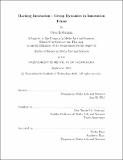| dc.contributor.advisor | Alex "Sandy" P. Pentland. | en_US |
| dc.contributor.author | Lederman, Oren | en_US |
| dc.contributor.other | Massachusetts Institute of Technology. Department of Architecture. Program in Media Arts and Sciences. | en_US |
| dc.date.accessioned | 2016-03-25T13:25:39Z | |
| dc.date.available | 2016-03-25T13:25:39Z | |
| dc.date.copyright | 2015 | en_US |
| dc.date.issued | 2015 | en_US |
| dc.identifier.uri | http://hdl.handle.net/1721.1/101790 | |
| dc.description | Thesis: S.M., Massachusetts Institute of Technology, School of Architecture and Planning, Program in Media Arts and Sciences, 2015. | en_US |
| dc.description | This electronic version was submitted by the student author. The certified thesis is available in the Institute Archives and Special Collections. | en_US |
| dc.description | Cataloged from student-submitted PDF version of thesis. | en_US |
| dc.description | Includes bibliographical references (pages 95-101). | en_US |
| dc.description.abstract | Innovative work is gradually shifting towards collaborative efforts by larger, multidisciplinary teams, making team efficacy an increasingly important field of study. Researchers in this field have mainly focused on laboratory experiments, which may not fully capture the complex situations that teams encounter in real life. The alternative, field studies, are difficult to maintain and often require significant time to produce results. In this thesis we propose a methodology that bridges the gap between these two settings -- the laboratory and the field. By combining a new, affordable electronic badge that captures vocalization data with an innovative setting -- the Hackathon -- we create a new environment for studying team performance. This methodology reduces the duration and maintenance burden of such studies, and offers new opportunities for examining the effects of interventions on teamwork. The preliminary results from our studies show a variety of individual and team behaviors that can be captured in Hackathons using badges, such as participation, the parity of contribution to group discussions, the level of turn taking, and the frequency and duration of meetings. In a Hackathon, we measure these behaviors throughout the entire life cycle of each team, observe how they change in response to different shocks, and study how well the team members collaborate and perform as a team. | en_US |
| dc.description.statementofresponsibility | by Oren Lederman. | en_US |
| dc.format.extent | 101 pages | en_US |
| dc.language.iso | eng | en_US |
| dc.publisher | Massachusetts Institute of Technology | en_US |
| dc.rights | M.I.T. theses are protected by copyright. They may be viewed from this source for any purpose, but reproduction or distribution in any format is prohibited without written permission. See provided URL for inquiries about permission. | en_US |
| dc.rights.uri | http://dspace.mit.edu/handle/1721.1/7582 | en_US |
| dc.subject | Architecture. Program in Media Arts and Sciences. | en_US |
| dc.title | Hacking innovation - group dynamics in innovation teams | en_US |
| dc.type | Thesis | en_US |
| dc.description.degree | S.M. | en_US |
| dc.contributor.department | Program in Media Arts and Sciences (Massachusetts Institute of Technology) | |
| dc.identifier.oclc | 941800636 | en_US |
